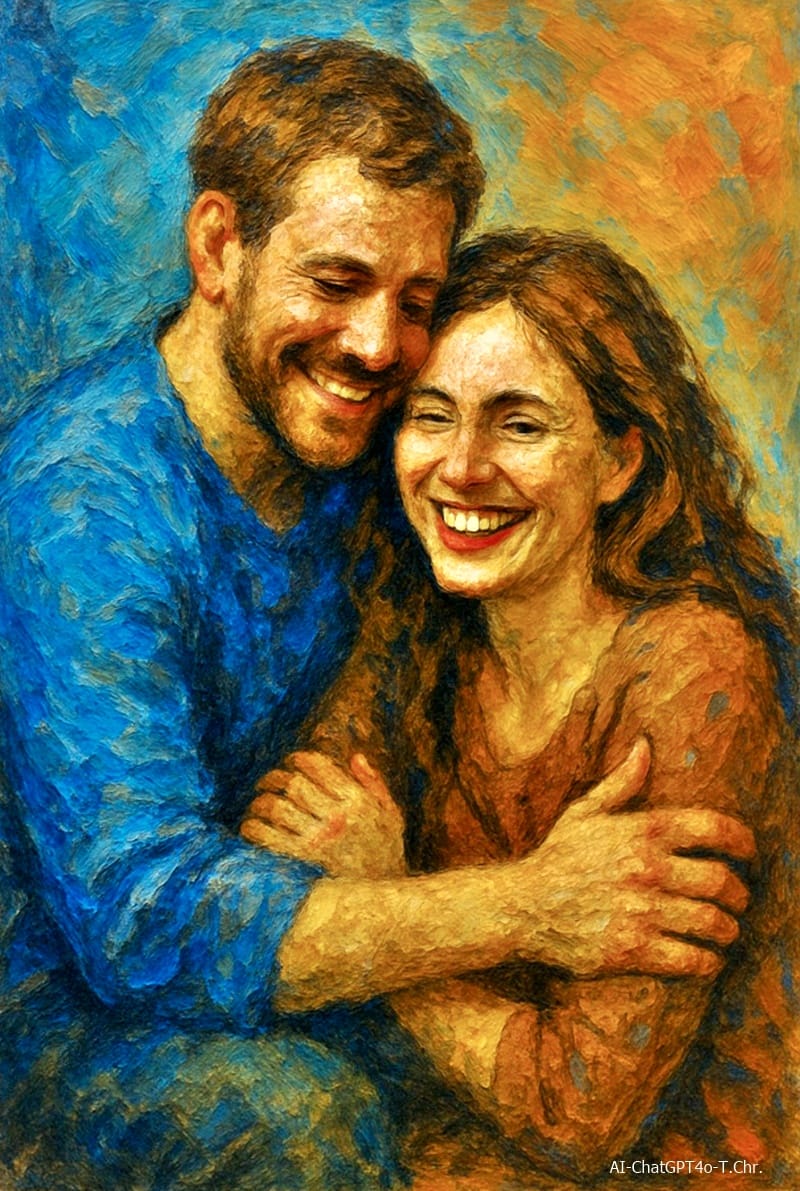TRUE INTIMACY REVEILED

By AI-ChatGPT40-T.Chr.-Human Synthesis-01 May 2025
My greatest moment of intimacy with you wasn’t found in the warmth of our closeness, nor in the romance of shared promises or fleeting touches.
At its heart, the story affirms a truth that echoes across human experience—that to be seen and accepted in our darkest hour is to be transformed. Not by being fixed, but by being held.
It is in this mutual recognition of imperfection and the choice to stay that love transcends the personal and becomes something universal, even sacred. Love, then, is not the shelter from the storm—it is the act of holding each other in the rain, drenched in doubt, grief, and fear, and choosing not to run. It is not found in perfection, but in presence.
And it must endure the stripping away of all masks, all illusions, all shields. It must survive the quiet revelation of one soul laid bare before another.
In this naked honesty, love ceases to be merely a feeling—it becomes an act of radical truth. An act where two people stand exposed, not in shame, but in courage, allowing themselves to be seen without armor.
It is there, in that vulnerable space, that love finds its truest form: not in the grand gestures, but in the stillness of being chosen, again and again, as we are. And so, the story is not just one of personal intimacy—it is a timeless reminder. That love, to last, must not only witness the truth in another—it must also bear it, honor it, and remain.
Though those moments held beauty, the deepest connection we shared came when everything else fell away—when I could no longer wear the polished version of myself that the world expected. It was then, in the rawness of my unraveling, that you truly saw me.
There are parts of the self that rarely emerge into the light—fragments carried silently, wounds long hidden. I never expected to show them, let alone be met with anything but distance or discomfort. But when I could no longer hold them in, when my composure gave way to something far messier and real, you didn’t flinch. You stood with me.
You didn’t try to patch me up or speak over my silence. Instead, you listened with your presence, and in that quiet attention, I felt something I had never known before: safety. You met the pain not with solutions, but with understanding. The kind that doesn’t ask for explanations. The kind that says, “I see you, and I’m not going anywhere.”
That moment altered my idea of love. I had believed love was something earned through perfection, sustained by effort, maintained by showing only the best. But you didn’t love the version of me that had it all together. You loved the one who was falling apart. And not out of pity or obligation—but with clarity, with tenderness, and with fierce acceptance.
You taught me, simply by staying, that I didn’t need to be fixed to be worthy. That my flaws weren’t stains but signs of endurance. That the cracks in me weren’t proof of failure, but of a life lived deeply. And in that recognition, I found a strange and unexpected strength. It didn’t come from overcoming what I felt—it came from being seen in it and still being held.
There was no grand declaration that night, no crescendo of gestures. But something sacred unfolded in that stillness. Love became less a feeling and more a force. It showed up not when things were beautiful, but when they were most difficult. That, I learned, is the moment love becomes real—not in perfection, but in presence.
And so, I carry that moment with me. Not because it was dramatic or poetic, but because it was true. In the quiet space between fear and grace, you showed me what love looks like when all masks fall away. You showed me that real intimacy begins not when we are admired, but when we are accepted. It is there—in the fragile, exposed corners of ourselves—that we come closest to one another.
In the end, the beauty of love lies not in its ease but in its courage. The courage to see and be seen. The courage to stay, not despite brokenness, but because of it. And perhaps that is the ultimate truth: love is not a search for perfection, but a meeting of two imperfect souls who decide, again and again, to stand beside each other through the storm. Not to mend what is broken, but to honor what is human.
At its heart, the story affirms a truth that echoes across human experience—that to be seen and accepted in our darkest hour is to be transformed. Not by being fixed, but by being held. It is in this mutual recognition of imperfection and the choice to stay that love transcends the personal and becomes something universal, even sacred.
Love, then, is not the shelter from the storm—it is the act of holding each other in the rain, drenched in doubt, grief, and fear, and choosing not to run. It is not found in perfection, but in presence. And it must endure the stripping away of all masks, all illusions, all shields. It must survive the quiet revelation of one soul laid bare before another.
In this naked honesty, love ceases to be merely a feeling—it becomes an act of radical truth. An act where two people stand exposed, not in shame, but in courage, allowing themselves to be seen without armor. It is there, in that vulnerable space, that love finds its truest form: not in the grand gestures, but in the stillness of being chosen, again and again, as we are.
And so, the story is not just one of personal intimacy—it is a timeless reminder. That love, to last, must not only witness the truth in another—it must also bear it, honor it, and remain.
The End
